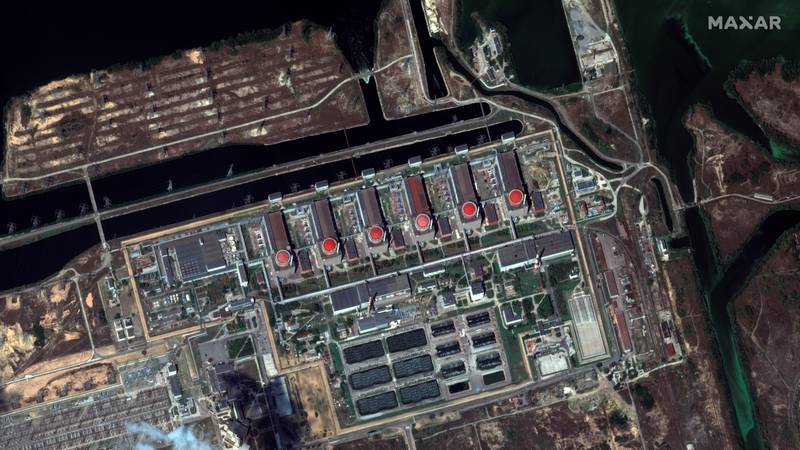Russia, Ukraine spar over fighting near nuclear facility
A fire at a munitions depot inside Russia forced the evacuation of two villages near the border with Ukraine, an official said, while two civilians were reported wounded by Russian shelling near the Zaporizhzhia nuclear power plant as both sides traded accusations about fighting near the facility in southern Ukraine.
The fire late on Thursday struck the munitions storage building near the village of Timonovo in Russia’s Belgorod region on Ukraine’s northeastern border. About 1100 people live in Timonovo and Soloti, about 25 kilometres from the border.
No one was hurt, said Belgorod regional Gov. Vyacheslav Gladkov.
The fire came days after another ammunition depot exploded on the Crimean Peninsula, a Russian-occupied territory on the Black Sea that was annexed by Moscow in 2014.


Last week, nine Russian warplanes were reported destroyed at an airbase on Crimea, demonstrating both the Russians’ vulnerability and the Ukrainians’ capacity to strike deep behind enemy lines.
Ukrainian authorities have stopped short of publicly claiming responsibility. But President Volodymyr Zelenskyy alluded to Ukrainian attacks behind enemy lines after the blasts in Crimea, which Russia has blamed on “sabotage.”
Russian Deputy Foreign Minister Sergei Ryabkov said in televised remarks on Friday that statements from Ukrainian officials about striking facilities in Crimea mark “an escalation of the conflict openly encouraged by the United States and its NATO allies”.
Ryabkov said Russian officials had warned the US against such actions in phone calls with high-level members of the Biden administration, adding that “deep and open US involvement” in the war in Ukraine “effectively puts the US on the brink of becoming a party to the conflict”.


In spite of the latest incidents, a Western official said the war is at a “near operational standstill”, with neither side able to launch major offensives.
“The whole tempo of the campaign has slowed down, partly because both sides have become more conscious that this is a marathon not a sprint and that expenditure rates and conserving their munitions is important,” said an official who spoke on condition of anonymity because he’s not authorised to discuss intelligence matters publicly.
Later on Friday, a Ukrainian official said two civilians were wounded by Russian shelling of Ukrainian communities neighbouring the Zaporizhzhia nuclear plant, the latest in a long string of such shelling accusations over the past weeks.
“A new enemy attack on the Nikopol district. Five shells fired by Russian cannon artillery flew into the residential areas of Marhanets,” Valentyn Reznichenko, the regional governor, said on Telegram.
Both Nikopol and Marhanets are Ukrainian-controlled towns which face the nuclear plant across the Dnieper River.

“According to preliminary reports, two people have been wounded: an 18-year-old girl and a 40-year-old man. Both are in hospital,” Reznichenko added.
‘Threat of a catastrophe on a global scale’
Kyiv and Moscow continued to accuse each other for the shelling near Europe’s largest nuclear power plant.
A senior official at the Ukrainian presidential office told reporters “the threat of an environmental catastrophe on a global scale” remains due to the “periodic shelling” of the plant by the Russian army.
Kyrylo Tymoshenko, deputy head of the presidential office, said at the same briefing that Russian shelling had destroyed “more than 3700 infrastructure objects” in the vicinity of the plant, including heating, electricity, gas and water supply facilities.
Zelenskyy also stressed the situation around the Zaporizhzhia plant in his Friday evening address.
“If Russia’s radiation blackmail continues, this summer may go down in the history of various European countries as one of the most tragic of all time. Because not a single instruction at any nuclear power plant in the world provides a procedure in case a terrorist state turns a nuclear power plant into a target,” he said.

Meanwhile, the Kremlin said that Russian President Vladimir Putin told French counterpart Emmanuel Macron in their first phone conversation since May 28 that Ukrainian shelling around the Zaporizhzhia nuclear power plant “raised the threat of a large-scale catastrophe that could lead to radioactive contamination of large territories.”
The Zaporizhzhia nuclear facility in Ukraine’s south has been controlled by Russian forces since shortly after the invasion began on February 24. Ukraine has accused Russia of storing troops and weapons at the plant and using its grounds to launch strikes against
Ukrainian-controlled territory. Ukrainian officials and military analysts say Moscow’s forces have cynically employed the plant as a shield, knowing that the Ukrainians would be hesitant to fire back.
Russia has denied the accusations and, in turn, accused Ukrainian forces of repeatedly shelling the plant.

The French presidency said in a statement that Macron “underlined his concerns” regarding the situation at the Zaporizhzhia plant and expressed his support for the deployment of a International Atomic Energy Agency mission to the site “as soon as possible.”
Putin agreed to the mission’s deployment under the discussed terms, according to the French statement. The Kremlin said that “the Russian side reaffirmed its readiness to offer the necessary assistance to the agency’s experts.”
Yevgeny Balitsky, the Moscow-backed chief of temporary administration for the Russia-controlled part of the Zaporizhzhia region, said on Friday that an IAEA mission could approach the plant from Ukrainian-held territory, a shift in Moscow’s position which previously had suggested that the mission should travel to the plant from Crimea.

“I believe they may also come from the side of Ukraine,” Balitsky said in televised remarks. “We can safely bring them to the plant and show where the fire is coming from and who is shooting.”
Mikhail Ulyanov, the Russian envoy to international organisations in Vienna where the IAEA is based, said he believes a visit by the agency could realistically take place in early September.








